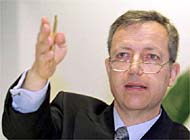
Former Geneva police chief closes in on war crimes suspects

Nine months after becoming the chief investigator for the International Criminal Tribunal on Rwanda, Laurent Walpen has been talking to swissinfo about the challenges he is confronted with in tracking down those who carried out the genocide of 1994.
Walpen, the former head of Geneva’s cantonal police, says that one of the biggest obstacles preventing him from doing his job effectively is a lack of personnel.
While he has a staff of 107 former police, lawyers and magistrates to carry out investigations, he has just 15 people actively searching for the suspects on the ground.
“We need more people to find the perpetrators of the genocide. We have 15 people covering the whole world,” he says.
He said the year 2000 was a pivotal year for the tribunal, which is based in the Tanzanian town of Arusha, as it decided to reorganise the investigations division.
“This process will not last for decades. We have decided to concentrate our efforts on the main targets,” Walpen told swissinfo before returning to the Rwandan capital, Kigali, after a break in Switzerland.
He said his department had been split into three teams, one pursuing former members of the government, another chasing armed forces officers and a third the mass media and intelligentsia. In total, 17 suspects are being sought around the globe.
He says his efforts are made more difficult by the fact that some governments are protecting these suspects.
The Arusha tribunal has been accused of acting too slowly in meting out justice to those responsible for the genocide, in which as many as 800,000 people, most of them Tutsis, were killed by Hutu extremists between April and July 1994.
Despite having a staff of around 900 employees and a budget of $79 million, the court has sentenced only eight people in six years.
“The tribunal is holding 45 big fish. These are the Goebbels and Goehrings of Rwanda,” Walpen says, pointing out that the court concentrates on bringing to justice those officials who have gone into exile and whom Rwanda would have trouble tracking down alone.
“Some important trials will get under way in 2001,” he predicted.
While the Arusha tribunal is trying these exiled ringleaders, some 125,000 people are awaiting trial inside Rwanda in connection with the genocide. More than 100 have been sentenced to death, though only a handful have been executed.
“The Rwandan people are more concerned with those in Rwandan jails than with what is happening in Arusha,” Walpen says.
Nevertheless, he feels that his work is significant: “It is important to dissuade other countries from following the path of genocide. It is also important to show that there can be no reconciliation without justice.”
That justice must be shown to be even-handed. In a significant step, a month ago, Walpen and his team began investigating the Rwandan Patriotic Front (RPF), the former Tutsi rebels now in power in Kigali.
He explains that it is in the mandate of the International Criminal Tribunal on Rwanda (ICTR) to investigate all crimes against humanity that were committed in Rwanda between January 1 and December 31 1994.
“Until now, we have concentrated on those who carried out the genocide. But clearly, there were massacres committed by those now in power, and these acts also need to be investigated,” Walpen says.
He says the Rwandan government has assured the UN’s chief war crimes prosecutor, Carla del Ponte, that they will collaborate with the investigation:
“It is not in their interests to cover up this episode in their past,” he says, adding that it is not yet possible to say whether current senior Rwandan government officials would be implicated in these crimes.
by Roy Probert

In compliance with the JTI standards
More: SWI swissinfo.ch certified by the Journalism Trust Initiative




























You can find an overview of ongoing debates with our journalists here . Please join us!
If you want to start a conversation about a topic raised in this article or want to report factual errors, email us at english@swissinfo.ch.